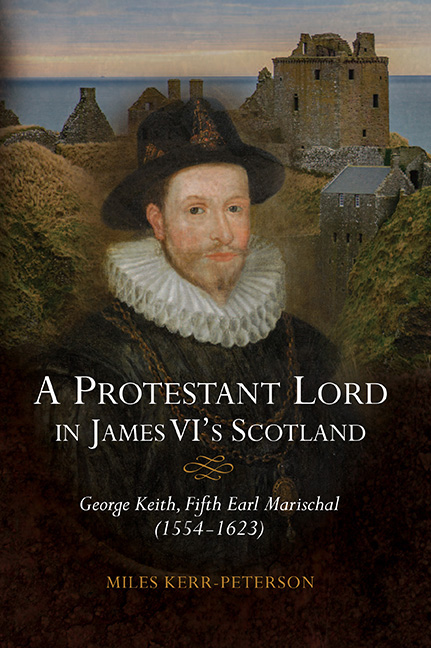Book contents
- Frontmatter
- Contents
- List of Illustrations
- Acknowledgements
- Conventions
- Abbreviations
- Map
- Introduction
- 1 Inheritance and Education, 1513–1582
- 2 Three Feuds and Jacobean Politics, 1582–1595
- 3 Service to the State, 1595–1623
- 4 Defending the Borders of the Earldom, 1595–1623
- 5 Family Strategies and Crises, 1595–1623
- 6 Lordship and the Reformed Kirk, 1560–1623
- 7 Economic Activities, 1581–1623
- 8 Marischal College, 1593–1623
- Conclusion
- Appendices: Genealogies
- Bibliography
- Index
- St Andrew Studies in Scottish History
2 - Three Feuds and Jacobean Politics, 1582–1595
Published online by Cambridge University Press: 13 April 2019
- Frontmatter
- Contents
- List of Illustrations
- Acknowledgements
- Conventions
- Abbreviations
- Map
- Introduction
- 1 Inheritance and Education, 1513–1582
- 2 Three Feuds and Jacobean Politics, 1582–1595
- 3 Service to the State, 1595–1623
- 4 Defending the Borders of the Earldom, 1595–1623
- 5 Family Strategies and Crises, 1595–1623
- 6 Lordship and the Reformed Kirk, 1560–1623
- 7 Economic Activities, 1581–1623
- 8 Marischal College, 1593–1623
- Conclusion
- Appendices: Genealogies
- Bibliography
- Index
- St Andrew Studies in Scottish History
Summary
The aftermath of the Ruthven Raid saw George Keith, Earl Marischal, thrown into the depths of factional court politics. The following years saw a series of intense struggles, pitting the earl against his great territorial rival, George Gordon, earl of Huntly, and for a time in a lull in this feud, with the Chancellor of Scotland, John Maitland of Thirlestane. Marischal's own disputes became intimately caught up in the backdrop of wider and larger Scottish court struggles, such as those between Huntly and Maitland at court, or Huntly and his other territorial rivals; international diplomacy with England, Spain, France, Denmark and Sweden; and sectarian conflict between the Kirk and the perceived Catholic threat. Despite the high politics, shifting alliances and even violence, this period of activity came to a sudden and abrupt end for the earl in 1595, when these disputes seemed to largely resolve themselves.
This is a long and complicated chapter in the earl's career, taking in almost all of his activities, political, religious and even economic, at court, in the locality, within his lordship and within his close family. But this period is worth exploring in detail, to reveal the fine, interrelated mechanisms that made up the essence of his lordship. Through his actions and reactions we find his motivations and priorities, as well as the nature, extent and limits of his power. The period can be divided into three largely distinct periods, focusing on three of the earl's feuds. The first covers the period 1582 to 1589, and an essentially territorial dispute, with a major courtly element, with the earl of Huntly, centred around that earl's jurisdiction as Lieutenant of the North. The second period, 1589 to 1591, sees a shift to a mostly court-based feud with Chancellor Maitland, focused mainly upon the earl's loss of influence at court during and following his ambassadorial mission to Denmark. Finally, the third period, 1591 to 1595, sees a return to the feud with Huntly, albeit the emphasis this time being upon wider political coalitions, rather than immediate territorial concerns.
Marischal and Huntly, 1582 to 1589
The period between the political crises of the Ruthven Raid in 1582 and the Brig o’ Dee rebellion in 1589 saw Marischal come into direct and bloody conflict with the earl of Huntly.
- Type
- Chapter
- Information
- A Protestant Lord in James VI's ScotlandGeorge Keith, Fifth Earl Marischal (1554–1623), pp. 30 - 71Publisher: Boydell & BrewerPrint publication year: 2019



